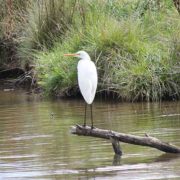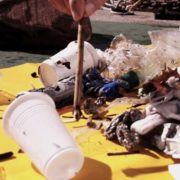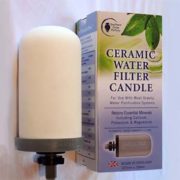How you can help our waterways
The growing urban population is placing increased pressure on our lakes and rivers as more rubbish, leaves, gravel, cigarette butts, fertilisers, animal faeces and chemicals are washed into our stormwater systems.
In every city these stormwater systems run into our river system and water storage basins. Besides being a source of our drinking water, these rivers and basins are home to a ecosystem of birds, fish, trees and wetlands – many of which are threatened species.
Many governments, local and federal, around Australia in particular the Australian and ACT governments which have joined forces to launch a new education program, “H2OK: Keeping our waterways healthy”. The program is part of the Healthy Waterways Project which in the ACT alone is a $93.5 million project which includes the construction of water quality infrastructure on up to 25 sites around the capital territory.
The message is simple – “Only rain down the stormwater drain”.
As the Minister for the Environment and Heritage Mick Gentleman said, “H2OK: Keeping our waterways healthy aims to reduce pollutants entering our waterways by engaging with the community and teaching people better ways to keep pollutants out of our water. The program highlights key habits that contribute to poor water quality such as raking or blowing leaves into the drains, over fertilising and washing cars in driveways.”
Rake up autumn leaves – turn them into mulch or compost
- Don’t sweep or blow leaves or grass clippings into gutters and stormwater drains; they decompose and release polluting nutrients into our waterways.
- Instead, turn leaves into mulch to protect your soil or compost for your garden, take them to a green waste recycling facility or, if you have one, put them in your green waste bin.
Recycling leaves and grass and using them on your garden can save you money and help you create a water-efficient garden. - Safety first. Never sweep or rake leaves from the road, only from the verge and make sure you face the traffic.
Look after your nature strip
- Keep your nature strip free of leaves, grass clippings and litter. It’s the area closest to the street so anything left on the nature strip easily makes its way into stormwater drains when it rains.
- Use a catcher when mowing your lawn. Clippings make great compost.
- Avoid parking on your nature strip or front yard. Cars cause the soil to be compacted and kill the grass which means water doesn’t soak into the ground. Instead, it washes sediment into the stormwater drain.
Maintain your vehicle
- Make sure your car doesn’t leak oil or any other fluids, including coolants. Chemicals are very harmful to our waterways.
- ash your car and other equipment on grassed or gravelled areas so that harmful detergents can soak into the ground.
- Consider washing your vehicle at a commercial car wash facility.
Look after your drains
- Paint or paint cleaners and other hazardous household waste are toxic to aquatic animals, other wildlife and humans. They don’t belong in the stormwater drain. Instead, dispose of them at your local resource management centre.
- Pick up any litter on your block or in the street
- Put rubbish in its place. Use bins for waste, put paper and plastic in the recycling.
- Make sure your bins stay closed when you put them out for collection; rubbish can easily blow out of bins that are over-full.
- If there is rubbish on your street, do the right thing, pick it up and put it in the bin.
- Keep poo out of the water
- Owners are responsible for cleaning up after their pets– scoop it, bag it and put it in the bin. Dog poo left on footpaths and verges washes into our waterways via the stormwater system. Animal faeces contain bacteria and contribute to higher ecoli counts in waterways, posing a serious health threat to swimmers, recreational users and wildlife.
- When ecoli levels are too high, lakes across the region are closed. Increased nutrients (from decomposed organics like leaves) can lead to blue-green algal blooms and lake closures. Blue-green algae can be harmful to humans and can be deadly to pets.
- Avoid feeding ducks, swans and wildlife with bread and other food. They eat mostly plants and algae so human food is not good for their health. It also increases the risk of faecal contamination in our waterways.
Keep gravel on your block
- When it rains even gravel can wash into the stormwater drain so make sure it is contained by edging.
- Make your garden stormwater-ready.
- Avoid fertilising your garden or using pesticides just before or during rain. The run-off can carry the excess into the stormwater system.
- Plant lots of natives and groundcovers to help slow stormwater down and reduce sediment run-off.
- Install a tank to collect and reuse rainwater before it becomes stormwater.
- Disconnect your downpipe and create a rain garden.
Avoid over-watering your gardens and lawns—even in summer, you only need to water once or twice a week.
Cigarette butts belong in the bin
- Butt out responsibly; bin it, don’t flick it.
- When cigarette butts are left on the ground, on roads and on footpaths, they are washed down gutters and into our lakes and waterways. A cigarette butt takes more than two years to break down in fresh water. Fish, birds and aquatic animals can mistake the butts as food, resulting in serious digestive problems that may lead to death.
- Toxic chemicals such as lead and cadmium, which are trapped in the cigarette filter, can leach out in water. Within just one hour of contact with water, the chemicals begin to leach into the aquatic environment. One cigarette butt in a litre of water can kill a fish. Find out more about cigarette littering.
You could also volunteer in your neighbourhood. Volunteering for the environment is a great way to make a difference.
Learn more about where you live, get outdoors, stay fit and meet new people.
For those that are interested in the ACT Project click here “H2OK”





